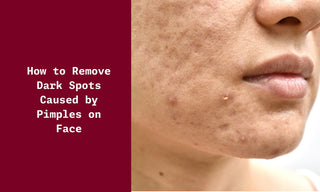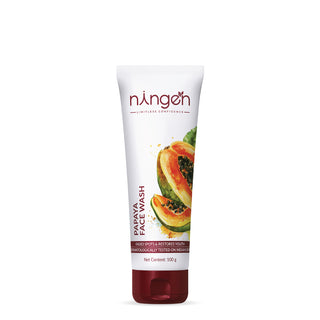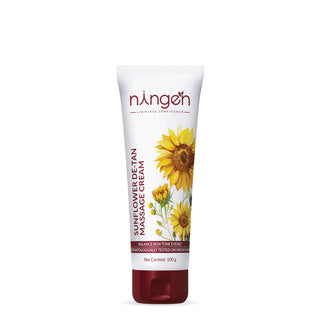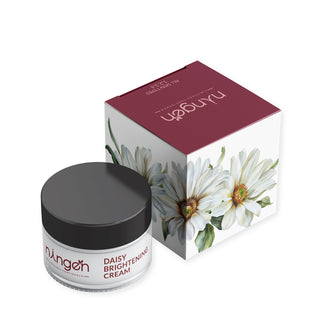Do you have dark spots on your face that you're desperate to get rid of?
If yes then you’re at the right place!
Dark spots left behind by pimples can be a persistent reminder of past breakouts, affecting our confidence and leaving us longing for our clear, even-toned skin. These pesky marks, known as post-inflammatory hyperpigmentation, can take weeks or even months to fade. But don't worry—this blog is here to guide you on how to remove dark spots caused by pimples and help you get back your radiant, blemish-free complexion. Read on to discover natural solutions, skincare tips, and lifestyle changes that will have you glowing in no time!
In This Article;
- Understanding Different Types of Dark Spots
- Causes of Dark Spots Caused by Pimples
- How to Remove Dark Spots Caused by Pimples on Face
- Wrapping Up
- TL;DR(Too Long;Didn't Read)
- Frequently Asked Questions
Understanding Different Types of Dark Spots
Dark spots resulting from acne come in various shades, and understanding the different types is critical in determining the most appropriate treatment approach. The color of these spots typically corresponds to the depth and severity of the skin damage and can range from red and purple to brown and black.
Red or Purple Spots
Red or purple spots are usually the earliest manifestation of post-inflammatory hyperpigmentation (PIH). These spots appear during or immediately following an acne breakout. Red spots are more common in individuals with lighter skin tones, whereas purple spots are often seen in those with darker skin tones. The discoloration is due to the dilation of blood vessels close to the surface of the skin as part of the inflammatory process. Over time, without additional irritation and with proper care, these spots can fade away.
Brown Spots
Brown spots arise when the inflammation from acne leads to an excess of melanin, which is the natural pigment that gives color to our skin. Individuals with medium skin tones are more prone to developing brownish post-acne marks. These spots often linger longer than red or purple discolorations and require a more targeted treatment approach, such as topical lightening agents, chemical peels, or laser therapy, along with stringent sun protection.
Black Spots
Black spots are less common but can occur, particularly in individuals with very dark skin. These represent a more concentrated accumulation of melanin. Black spots may appear where the acne lesions are more severe, such as cystic acne, and can signify deep damage to the skin. These types of dark spots are the most challenging to fade and typically need a combination of professional treatments and time.
Causes of Dark Spots Caused by Pimples
Dark spots caused by pimples, also known as post-inflammatory hyperpigmentation (PIH), occur for several reasons. Understanding these causes can help you take preventative measures and choose effective treatments. Here are the main culprits:
- Inflammation: When a pimple forms, the skin becomes inflamed. This inflammation can stimulate the overproduction of melanin, the pigment responsible for skin color, leading to dark spots after the pimple heals.
- Sun Exposure: UV rays can worsen hyperpigmentation. When inflamed skin is exposed to the sun, it can produce even more melanin, making the dark spots darker and more persistent.
- Picking or Squeezing Pimples: Picking at or squeezing pimples can cause trauma to the skin, increasing inflammation and the likelihood of developing dark spots. This also increases the risk of infection, which can further exacerbate pigmentation.
- Hormonal Changes: Hormonal fluctuations, especially during puberty, menstruation, pregnancy, or due to certain medications, can increase the likelihood of acne and subsequent dark spots. Hormones can affect melanin production, leading to uneven pigmentation.
- Acne Severity: More severe acne types, such as cystic or nodular acne, are more likely to cause significant inflammation and damage to the skin, increasing the risk of dark spots once the acne heals.
- Skin Type: People with darker skin tones are more prone to developing hyperpigmentation. Their skin produces more melanin, which makes dark spots more noticeable and harder to fade.
- Improper Skincare Routine: Using harsh skincare products or not following a proper skincare regimen can irritate the skin, worsening inflammation and increasing the chances of dark spots forming after a breakout.
Note: Do you want to prevent pimples from appearing on your face? Read our other article by clicking the link.
How to Remove Dark Spots Caused by Pimples on Face
Dark spots caused by pimples, also known as post-inflammatory hyperpigmentation, can be frustrating and affect your confidence. Fortunately, there are several effective ways to treat and fade these spots, helping you achieve a clearer, more even complexion. Here's how:
1. Use Sunscreen Daily
- Why: UV exposure can darken spots and make them more persistent.
- How: Apply a broad-spectrum sunscreen with at least SPF 30 every morning, even on cloudy days. Reapply every two hours if you’re outside.
|
Protective Measure |
Benefit |
|
Broad-Spectrum Sunscreen |
Guards against UVA and UVB rays |
|
Reapplying Sunscreen |
Maintains consistent protection |
|
Sun Protective Clothing |
Adds a physical barrier to UV rays |
|
Seeking Shade |
Reduces direct UV exposure |
2. Incorporate Vitamin C
- Why: Vitamin C is a powerful antioxidant that brightens skin and reduces hyperpigmentation.
- How: Use a vitamin C serum daily under your moisturizer and sunscreen.
3. Try Retinoids
- Why: Retinoids promote cell turnover, helping to fade dark spots and improve skin texture.
- How: Apply a retinoid cream or serum at night. Start with a lower concentration to minimize irritation.
4. Exfoliate Regularly
- Why: Exfoliation removes dead skin cells, revealing fresher skin underneath and helping to fade dark spots.
- How: Use a gentle exfoliator containing alpha hydroxy acids (AHAs) or beta hydroxy acids (BHAs) 2-3 times a week.
5. Use Natural Remedies
If you're looking to fade dark spots caused by pimples naturally, several ingredients can help. These natural remedies are gentle on the skin and can be effective in reducing hyperpigmentation with consistent use. Here are some of the best natural ingredients to incorporate into your skincare routine:
- Aloe Vera
Benefits: Soothes skin, reduces inflammation, and promotes healing.
- Lemon Juice
Benefits: Natural bleaching properties help lighten dark spots.
- 3. Turmeric
Benefits: Contains curcumin, which has anti-inflammatory and antioxidant properties.
- Apple Cider Vinegar
Benefits: Contains acetic acid, which can lighten pigmentation.
- Honey
Benefits: Natural humectant with healing and antibacterial properties.
- Green Tea Extract
Benefits: Rich in antioxidants that can help reduce inflammation and lighten dark spots.
Benefits: Contains enzymes like papain that exfoliate the skin and promote cell turnover.
- Cucumber
Benefits: Soothes the skin and reduces pigmentation.
- Potato Juice
Benefits: Contains enzymes that can lighten dark spots.
Benefits: Rich in vitamins A and C, which help with skin regeneration and reducing pigmentation.
6. Hydroquinone
- Why: Hydroquinone is a skin-lightening agent that reduces the appearance of dark spots.
- How: Use a cream containing hydroquinone on dark spots, but be cautious with long-term use and consult a dermatologist.
7. Consider Professional Treatments
- Dark spots caused by pimples can be frustrating, but if over-the-counter products have not provided the desired results, medical treatments may be an effective alternative. These treatments, which should be carried out by qualified professionals, include chemical peels, microdermabrasion, laser therapy, and cryotherapy. Such procedures can target the deeper layers of the skin, encouraging regeneration and reducing hyperpigmentation. It's imperative to consult a dermatologist to determine which treatment is suitable for your skin type and condition.
-
Chemical Peels
- Chemical peels utilize various acidic solutions to remove the top layers of the skin, encouraging new, spot-free skin to grow in its place. Depending on the severity of the dark spots, peels can range from mild to deep.
|
Type of Peel |
Intensity |
Key Benefit |
|
Superficial |
Mild |
Minimal downtime |
|
Medium |
Moderate |
Targets deeper pigmentation |
|
Deep |
High |
More significant results |
- It is important to note that some redness and peeling are expected post-treatment, and sun protection is crucial to prevent further damage.
-
Microdermabrasion
- Microdermabrasion is a minimally invasive procedure that involves exfoliating the skin with an abrasive device to remove the outermost layer of dead skin cells.
|
Outcomes |
Post-Treatment Care |
|
Smoother skin |
Moisturize and protect from sun |
|
Reduced pigmentation |
Gentle skin care routine |
- Typically, multiple sessions are needed for best results, and there is little to no downtime involved.
-
Laser Therapy
- Laser therapy uses concentrated light to target and break down melanin that causes dark spots. There are different types of lasers, and your dermatologist will choose the most appropriate one based on your specific needs.
|
Laser Type |
Target |
Consideration |
|
Non-ablative |
Melanin only |
Less downtime, several treatments |
|
Ablative |
Full skin layer |
More downtime, more aggressive |
|
Fractional |
Specific areas |
Bridges the gap between two above |
- Post-treatment, patients may experience redness and swelling, with recovery time varying depending on the intensity of the treatment.
-
Cryotherapy
- Cryotherapy involves the application of extreme cold to the dark spots, destroying excess pigment-producing cells.
|
Procedure |
Potential Side Effect |
|
Quick application |
Temporary redness or blistering |
|
Precise |
Pigment irregularities in some cases |
- Usually, cryotherapy is a quick procedure with minimal discomfort, and it is suitable for isolated spots rather than large areas.
Note: Does chemical peel remove dark spots or skin tan? Read here.
8. Maintain a Healthy Skincare Routine
- Cleanse: Use a gentle cleanser to keep your skin clean and free from excess oil and impurities.
- Moisturize: Keep your skin hydrated with a non-comedogenic moisturizer.
- Spot Treatment: Use targeted treatments specifically designed for dark spots and acne scars.
|
Skincare Step |
Purpose |
Key Ingredients |
|
Cleansing |
To remove impurities and prevent clogged pores |
Salicylic Acid, Benzoyl Peroxide |
|
Toning |
To balance skin's pH and remove residual dirt |
Witch Hazel, Glycolic Acid |
|
Moisturizing |
To hydrate and protect skin |
Non-comedogenic oils, Hyaluronic Acid |
|
Treating |
To directly target acne and prevent future breakouts |
Retinoids, Vitamin C |
9. Patience and Consistency
- Dark spots can take time to fade. Be consistent with your skincare routine and give treatments time to work.
By following these steps, you can effectively reduce and remove dark spots caused by pimples, helping you regain a clearer and more even skin tone.
Explore our handpicked selection of the best skincare for preventing pimples and dark spots caused by pimples, listed below.
Wrapping Up
Dealing with dark spots caused by pimples can be challenging, but with a consistent and targeted approach, you can significantly reduce their appearance and restore your skin’s natural glow. Understanding the types of dark spots and their causes is essential in choosing the right treatments. Incorporating daily sun protection, using ingredients like Vitamin C and retinoids, and considering natural remedies can help fade these spots over time. For more stubborn pigmentation, professional treatments such as chemical peels and laser therapy may be necessary. Remember, patience and consistency are key in achieving and maintaining clear, even-toned skin.
Quick view
Dark spots from pimples can be treated with daily sunscreen, Vitamin C, retinoids, and regular exfoliation. Natural remedies like aloe vera, lemon juice, and turmeric also help. For persistent spots, professional treatments like chemical peels and laser therapy are effective. Consistent skin care and patience are crucial for best results.
Frequently Asked Questions
Q1. What causes dark spots after pimples?
Dark spots, also known as post-inflammatory hyperpigmentation (PIH), are caused by inflammation from pimples which triggers excess melanin production, leading to discoloration.
Q2. Can I remove dark spots on my face naturally at home?
Yes, natural remedies such as aloe vera, lemon juice, turmeric, and honey can help lighten dark spots with consistent use.
Q3. How effective is sunscreen in preventing dark spots?
Sunscreen is crucial in preventing dark spots from worsening. It protects your skin from UV rays that can darken and prolong the presence of dark spots.
Q4. What over-the-counter products can help fade dark spots?
Products containing ingredients like Vitamin C, retinoids, alpha hydroxy acids (AHAs), and beta hydroxy acids (BHAs) are effective in reducing dark spots.
Q5. How long does it take for dark spots to fade?
The time it takes for dark spots to fade varies based on the severity of the spots and the treatment used. It can take anywhere from a few weeks to several months.
Q6. Are professional treatments necessary for severe dark spots?
For stubborn or severe dark spots, professional treatments such as chemical peels, microdermabrasion, laser therapy, and cryotherapy can be very effective.
Q7. Can I use lemon juice to lighten dark spots?
Yes, lemon juice has natural bleaching properties. However, it should be used cautiously and always followed by sunscreen, as it can make your skin more sensitive to sunlight.
Q8. Is it safe to use hydroquinone for dark spot removal?
Hydroquinone is a potent skin-lightening agent that can be effective for dark spots. It should be used as directed and under the guidance of a dermatologist to avoid potential side effects.
Q9. Do dark spots caused by pimples go away on their own?
Yes, dark spots can fade on their own over time, but the process can be slow. Treatments can help accelerate the fading process.
Q10. What lifestyle changes can help prevent dark spots?
Maintaining a regular skincare routine, avoiding picking or squeezing pimples, using sunscreen daily, and eating a balanced diet rich in antioxidants can help prevent and reduce dark spots.
Q11. Why do pimples turn black?
Pimples turn black primarily due to post-inflammatory hyperpigmentation (PIH), where inflammation from the pimple causes an overproduction of melanin. Additionally, blackheads (open comedones) turn black when the contents oxidize upon exposure to air. Picking or squeezing pimples can also cause trauma, leading to darker spots.












sakib
Here are some effective facial home remedies to get rid of https://www.clearskin.in/blog/home-remedies-for-dark-spots-on-face/ on the face naturally along with the causes of dark spots